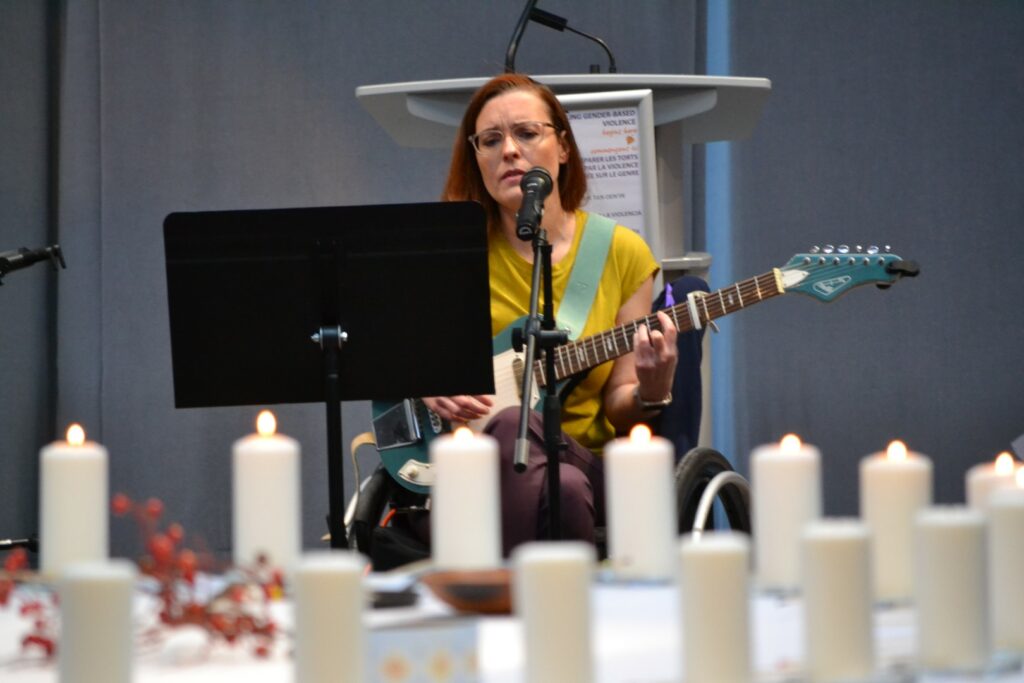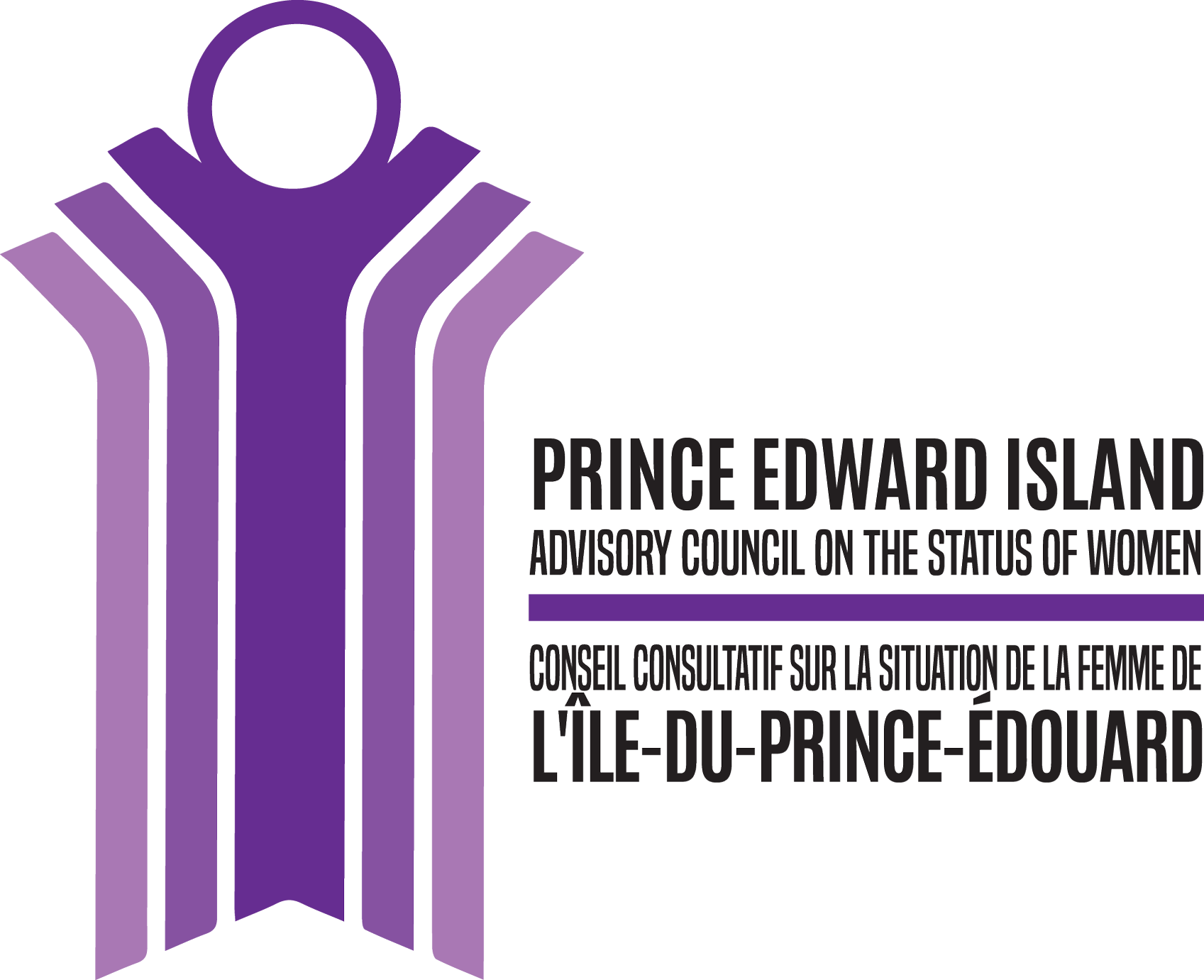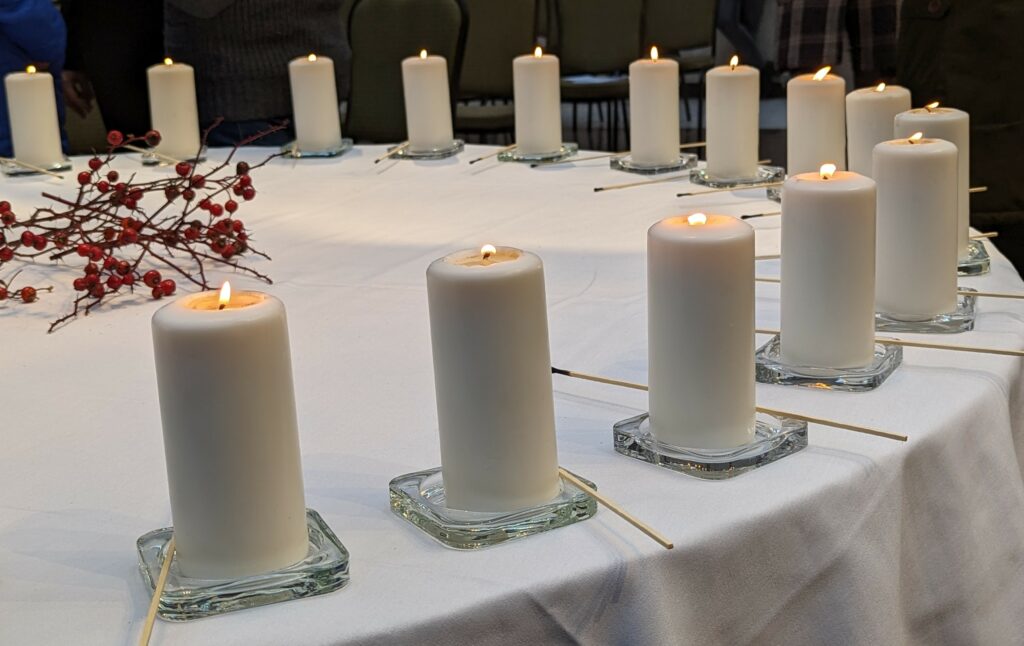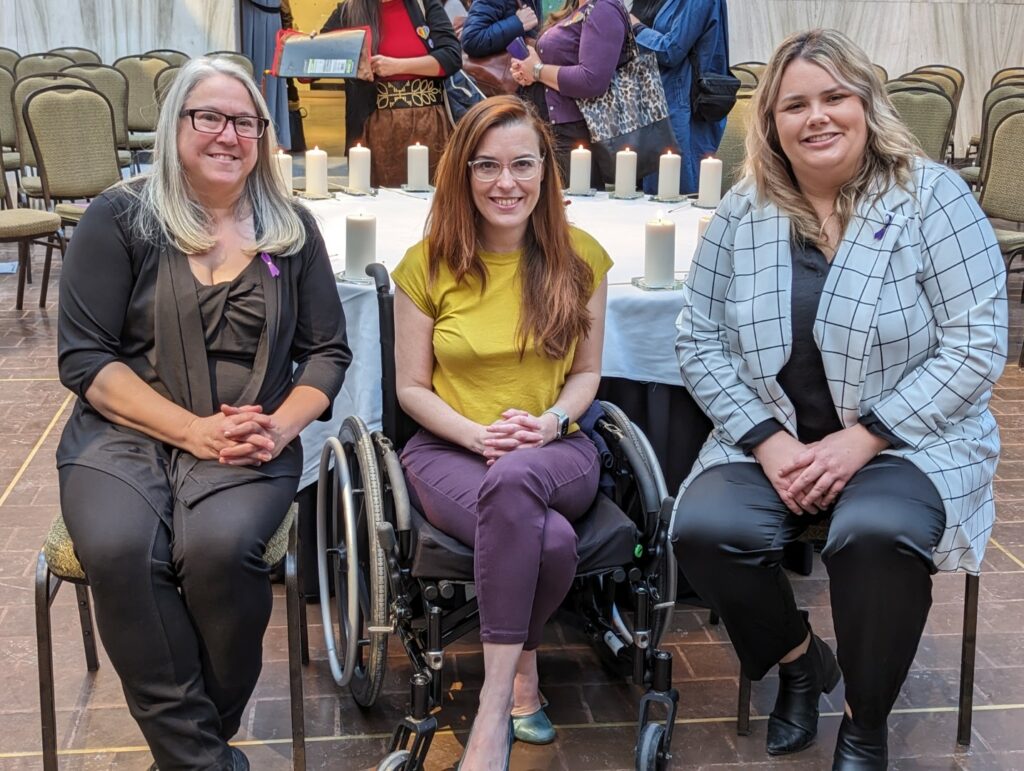
Guest speaker Nikkie Gallant performing her original song, “Too little, Too Late” during the Memorial Service on December 6.
Thank you
Thank you for asking me to speak today. This is important work. I wish we didn’t need to talk about these things, but I’m honoured to be sharing with you all today. Thank you, everyone, for making attending this a priority.
I want to take a moment to acknowledge how hard this day is for survivors, and how meaningful it is to see allies working on awareness, prevention, and on keeping the memories of those we’ve lost alive.
Content warning
I assume if you’re here today, you’re prepared to be exposed to heavy things, but just in case it’s helpful to know, I’ll be sharing personal accounts of intimate partner violence, and accounts of other gender-based violence.
Disclaimer
I need to give an extra disclaimer because this is PEI, and everybody knows everybody. And, because it’s a bit weird to be talking about intimate partner violence at my lovely ex-husband’s workplace. If you know him, or know any of my ex-partners, rest assured the things I’m sharing today are not about them, they are from the distant past, and took place during my time living elsewhere. I am thankful to partners I’ve had since that time for being so supportive of my ongoing healing around this.
Intro
Language matters. Words matter. I believe our understanding of gender-based violence, the prevention, the mitigation of harm, are all reliant on having the right words at the right time.
What it was like for me
I was in an abusive relationship for three years, starting when I was 19 and he was 28. When I share this, I often qualify it by saying that it wasn’t as bad as many other people’s experiences with abuse. I talk about how mild my abuse was, despite the fact that I knew my partner thought about killing me. He’d talked about it openly, multiple times, and I believe there were times he really wanted to.
I didn’t even use the word “abuse” until years after I’d gotten away. I need you to understand how hard it is to identify with being an “abuse victim.” How hard our psyches will work to avoid that association. How much we will put up with when we believe it’s just “relationship stuff we need to work on.”
He did all the classic stuff you hear about. Was on his best behavior for a long while. With hindsight, I can see some early warning signs, but his mask only slipped briefly once or twice in the few months before we were already living together.
It moves a lot slower than it looks like on tv. There are a lot of good moments, trust built, before the cracks start to really show.
He wanted kids right away, I didn’t. He decided we were engaged almost immediately, 2 months in. I thought he was joking, until months later when he was mad I hadn’t started planning the wedding yet. He did not propose.
He didn’t punch me.
That was the line I thought was required to be crossed for it to be called abuse. He was… disturbingly proud of not having punched me. Because he’d punched all his previous partners. And, also, because he’d wanted to so often.
He didn’t punch me.
But, he did choke me, he threw me against the wall, he punched things beside my head. He snapped the wheels off of our office chair by picking it up and slamming it back down, while I was sitting on it. He once grabbed my jaw so hard I needed painkillers for a week. This stuff was so commonplace, I didn’t even remember that having happened. The next day, when I was telling him about my pain, he said “Sorry,” I said, “What for?”
He threw me on the bed on my head, to keep me in the room, and prevent me from leaving to meet the friends we were supposed to go Christmas shopping with. I had to adjust my work tasks the next day, because I couldn’t turn my head at all.
He often wouldn’t let me leave the house. I was “allowed” to go grocery shopping, and out to do our laundry, but that was it. If I played shows, he treated me like I was going out trying to get attention, or something. I slowly stopped playing out, or doing things with my friends, who he considered toxic.
And, I was especially not allowed to leave the apartment while he was yelling at me. When I would try to get away, he would physically restrain me, even going so far as to pull me back in, when I tried to escape out a window.
One time, he was especially angry on a drive, and I didn’t know what would happen next. I jumped out of the car at a stoplight and ran for it, hiding in a gas station bathroom until it seemed safe to come out, then ran home through a path of back alleys, picking my way, hiding as best as I could behind garages, bushes, garbage cans, hoping I could get home to my car before he saw me.
He told me several times that he would kill me if I ever left, and whoever I was with next, too. I believed him. He told me he “knew a pig farmer, they’d never find me.” This was long before the Pickton murders, and I had no idea how knowing a pig farmer would help him. (The impact of his words lost some steam from him having to explain it. Sort of how it’s not funny anymore when you have to explain a joke.)
He did all these things and more. And, at the time, I didn’t have the word abuse for that behaviour. When the neighbours heard me yelling “Don’t touch me” and called the police, I told them the neighbours were just being nosy. That every couple fights. That he was just trying to hug me when I had yelled that. I did not explain to the officer that his hug was an attempt to block me from running up the stairs, out of our basement apartment, and away from him. He was angry before, and I could imagine how angry he’d be if I didn’t defend him to the police. And, I believed the things I’d said. That it was normal.
Fights. I called them fights. What else was I supposed to call them? What’s the verb for one partner screaming in another partner’s face who is curled up into a ball crying and scared, wishing they could skip forward to the part where the yelling partner is on their knees on the kitchen floor apologizing and crying into your stomach while you stand there caressing their head. Comforting them. “It’s ok, baby, it’s ok. I still love you, we’ll get through this.” What is the word? The word that is not so charged as abuse, but not so seemingly mutual as “fight?”
Years later, when I sought therapy to deal with recurring nightmares that were coming up, I fought my therapist on it when he first said the word abuse. He’d said “What you’re describing is defined as abuse. We call that abuse.” I truly didn’t know. How can we possibly help people get free from these situations when the language is not there?
Towards the end of the relationship. I’d found some words that did feel like home, that weren’t so charged, and that helped me to better understand what was going on. I’d come to define it as controlling behaviour, or toxic. Being able to identify with those words was key to my getting out. If you’re in a position to support people living with this kind of behaviour, these kinds of words might be easier for them to accept.
We hold so tightly to our identities, and the label of “abuse victim” sounds like someone else. And the word “abuser” feels so one-dimensional that it doesn’t match up with the person we know, the person who has many sides, just like the rest of us.
It’s easier to think of the person you’re with as being loving, too, to focus on those facets of them. It’s a basic act of self-protection to block out the harsher events. We soften them by trying to figure out why they act that way, and by looking for things we could have done to prevent it, as though we could ever be the cause of such horrible behaviour.
And as we know, people can be at a greater risk after leaving. I am grateful to have had friends who were supportive, who made it clear they would be there when I was ready. If you have anyone in your lives going through this, please take a trauma-informed approach when offering support. Make sure they know you’re there, free of judgment. Help them make a safe exit plan, if they’d like one. And then be there for them, even if leaving takes longer than you think it should.
So, what else can we do?
Well, we are lighting candles today, and that’s a good thing. We need the light. Like Brené Brown’s research on shame shows, shame thrives in the darkness, in silence. Gender-based violence thrives when we don’t talk about it.
We need to acknowledge that some groups are at a higher risk, and we need to keep working towards equity, on all fronts. We need to make space at the table for survivors, and for those whose voices are not heard, for members of marginalized communities, for those who face intersectional oppression.
There are currently politically-driven campaigns to stigmatize already marginalized groups who are at higher risk, like the 2SLGBTQIA+ community. We need to actively reject those efforts to divide us, and focus on inclusion. Anything less supports the kind of isolation abusers use to gain power.
Men: we need you to acknowledge, address, and oppose the pervasive underlying attitudes that dehumanize women, and other non-men. Please look deeply into your unconscious biases. Call it out when you see it. Call other men in.
And, we need preventive supports that focus on the perpetrators. The other challenge with the word “abuse” having so much charge is that I suspect many would struggle with identifying with the label of “abuser” for themselves. The man I told you about would likely not consider himself an abuser. I expect he would be very upset to hear that I do. We might also benefit from having messaging around how to tell if you’re abusing someone, too, for the types of abusers who might be more inclined to accept help. And, it also wouldn’t hurt to normalize the concept of men asking for help when they need it, in general.
We need to protect access to abortion. It’s not political. It’s safety. If I’d have gotten pregnant with that man, I’m confident he would have used a child to terrorize me for the rest of our lives. Many abusers are well aware of the control having a child would give them. It’s basically on page one of their “playbook.”
Many have already spoken on it recently, but it needs to be said that there is a lot of work to be done around justice in general. What we have is not working to protect from harm.
There are so many layers to this. We need to teach kids about setting healthy boundaries. We need to model it by respecting theirs, they’re allowed to have boundaries. How many of you have told your kids they have to hug “uncle so and so.” We condition them from such a young age that they don’t have bodily autonomy. This affects so many things.
There are current threats against important sex ed curriculum. This curriculum helps to keep kids safe. I know some of you here have the power to keep this education in place. It’s imperative that you do so. We had a consent module in my grade one class. It was a great program. Some of you might remember it? “My body’s nobody’s body but mine” But, it was too late to protect me from the man who molested me before I was even old enough for school. Please know that it is never too early to teach age-appropriate consent. People who harm others are most often just normal people you know, and believe me, they’re not waiting until a kid is some arbitrary age.
We need to learn how to prevent harm, and we also need to be doing more to mitigate it. Someone on the internet said: “Therapy should be free and accessible because getting traumatized is free and accessible.”
We need to model healthy relationships, too. How many of you who have children would want your children to have relationships exactly like yours? I hope all of you have consistently loving and respectful relationships, but unhealthy dynamics have long been quite normalized. Deep-seated beliefs about gender-based power dynamics often play out in the home and contribute to the types of attitudes that underlie gender-based violence.
Words are powerful.
Sometimes those words are, “We’re going to support organizations on the front lines who are actively working on prevention, education, and support for survivors with consistent, and appropriate funding.” (I specifically don’t mean law enforcement agencies.)
Sometimes those words are, “We’re going to eliminate poverty.”
Providing Universal Basic Income has been shown to have financial benefits in the long-term, as well as being a social positive.
Sometimes those words are, “We’re actually going to enforce rental regulations, including the regulations that have long been in place around short-term rentals to return formerly long-term housing units to the market immediately.”
The work surrounding these issues isn’t vague. There are many actionable steps we could be taking right now, if there was political will. Enacting the short-term housing regulations the city has been postponing is basic intimate partner violence prevention work.
I need you to know that prioritizing business interests over those of your citizens is not an innocent, victimless choice. It has been causing direct harm to your constituents.
When I wanted to leave my ex, I called to see what housing supports were available in the city I was in, and there were no rooms available. I was lucky some friends let me sleep behind their loveseat before I was able to find a temporary room elsewhere. I was lucky I had people in my corner. I was lucky I had managed to get myself less isolated near the end. Many people don’t have a community. I was lucky. These kinds of relationships are like that by design. There needs to be options: low-cost, long-term housing. Now. Not in 5 or 10 years time, when builds catch up with the demand. Now.
And, this is just an aside, but any business person worth their salt would not be relying heavily on such a risky position, as many cities around the world have long had very restricted regulations on short-term rentals. The probability of regulations being enforced would have been in any basic SWOT analysis. While I feel for them having to adjust their expectations, such is life in the business world. We adapt, we divest, we rebuild, we rise again.
What it comes down to is that the basic human right to housing is vastly more important than the ability to profit off of housing. Please, do the right thing. We need enforcement.
And, can we please have a rental registry for the province?
OK, I know a lot of people have been working hard on these kinds of things, on writing policy and voting it through, for things that move us in a positive direction, including people in this room, and I want to thank you all for your work. It is very appreciated—and we absolutely need to keep going.
Other forms of gender-based violence, and final thoughts
Now, I’ve mostly been talking about intimate partner violence today, but living as a non-male-presenting person has made me the target for many gender-based violence incidents that have come from people I was not partnered with. And, I’m not unique. It’s not uncommon. I wish it was. We know, and likely respect MANY people who have committed these acts. I’m both horrified, and not at all shocked every time I hear of someone I know having hurt others in these ways.
We need to do something. We can’t keep pretending the people who cause harm are some faceless monsters, that they’re “other.” That if we just do X, Y, and Z, that we’ll be protected from it. We need to acknowledge that it is a systemic problem, that it requires all of us to fight it, and to heal from it.
It’s complex. But, it’s on all of us do what we can do to fix it.
I’ve said a lot of words today, and, we’ve barely scratched the surface.
Intro to song – Too Little, Too Late (original)
With intimate partner violence, I really need you to understand the seemingly-opposing polarities. It might seem strange that the songs I write about this type of thing often reflect love and compassion for the person who hurt me, but you do love them. And, you’re terrified of them. Both exist at the same time.
I believed my ex-fiancé wanted to get better. It seemed like we were both rooting for the good guy in him to win out in the end. I didn’t want to leave. I just wanted him to be loving. I had hope. I thought I could fix it.
by Nikkie Gallant
Guest Speaker
December 6, 2023 Montreal Massacre Memorial Service
L-R: Following the Memorial Service, Anastasia DesRoches (Musical performance), Nikkie Gallant (Guest speaker), and Serena Smith (PEIACSW Chairperson) pose for a photo.




